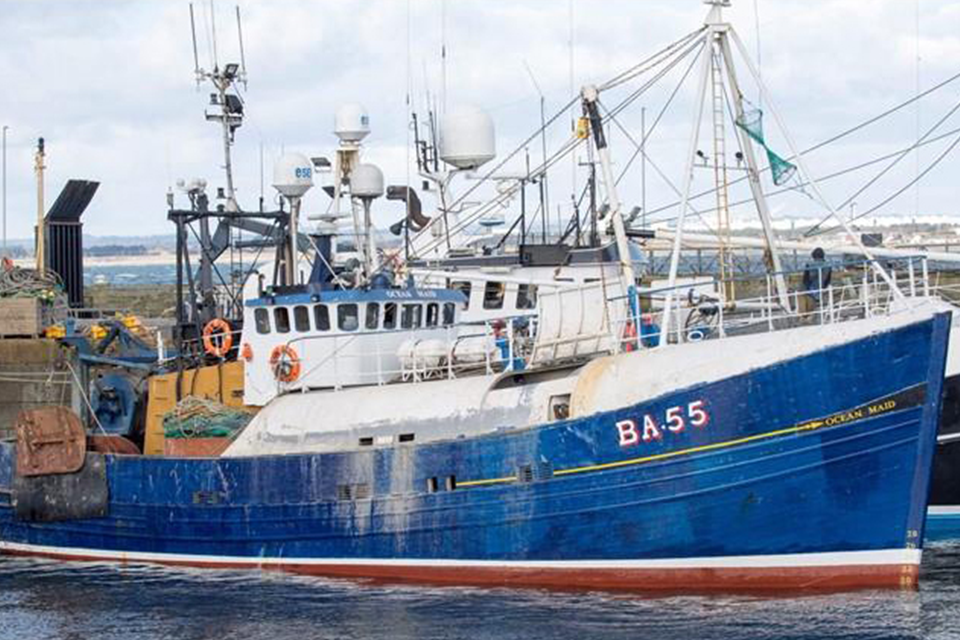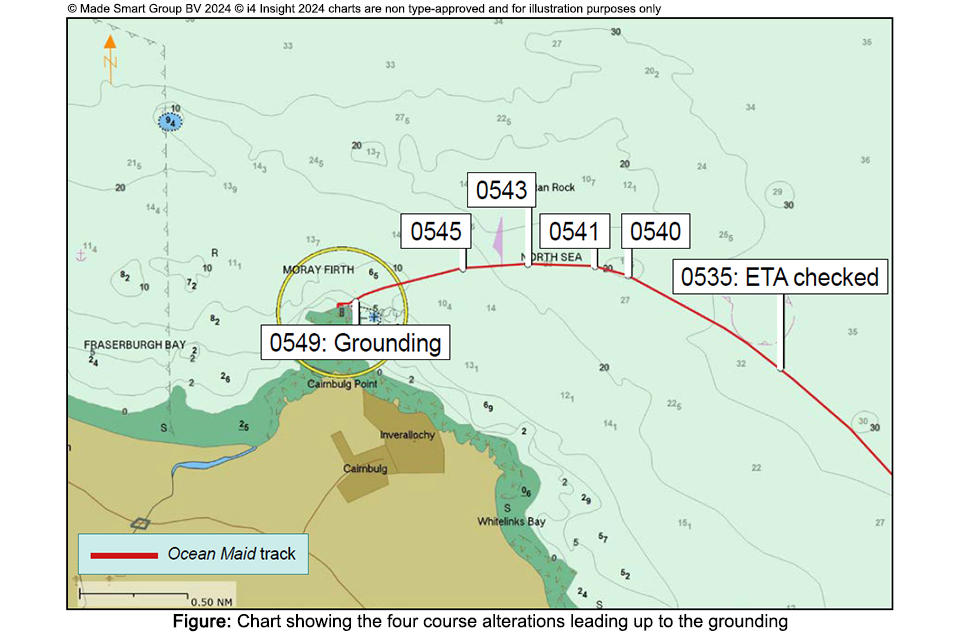Safety flyer to the fishing industry - Ocean Maid
Published 24 October 2024
1. Summary
Grounding and subsequent loss of the stern trawler Ocean Maid (BA 55) on Cairnbulg Point, Aberdeenshire, Scotland on 24 October 2022

Ocean Maid - image courtesy of Alex Young (Marine Traffic)
2. Narrative
On 24 October 2022, during the early morning and in poor visibility, the stern trawler Ocean Maid grounded on Cairnbulg Point near the port of Fraserburgh, Scotland. The vessel later broke up and sank.
Ocean Maid was on passage from Eyemouth to Fraserburgh for pre-arranged maintenance and was being navigated by a lone watchkeeper. The navigation equipment in the wheelhouse included three chart plotter displays, one of which the watchkeeper used to navigate by following the past tracks displayed on it and cross-checking these with external visual indicators to judge the vessel’s position. In the final few minutes before the grounding the watchkeeper left the wheelhouse at least twice to make tea for the crew, which was a normal task on the vessel’s approach into port. Between these visits to the galley, the watchkeeper made several course adjustments that gradually moved Ocean Maid towards Cairnbulg Point (see figure). The watchkeeper was absent from the wheelhouse at the time of grounding.

The skipper contacted the coastguard immediately after the vessel ran aground and the crew launched and inflated a liferaft. The movement of Ocean Maid was extreme as it rolled violently from side to side and was forced further onto the shoal by the swell so the crew abandoned into the liferaft and pushed it away from the side of the stricken vessel. They were rescued shortly afterwards by an all-weather lifeboat crew and subsequently treated for minor injuries.
3. Safety lessons
-
The hazard of leaving the wheelhouse unattended was recognised as a hazard in Ocean Maid’s on board risk assessment, but this did not stop it happening. The presence of a watchkeeper in the wheelhouse during passages is essential to maintain vessel safety, particularly in coastal waters.
-
Ocean Maid’s watchkeeper had been trained to follow past tracks displayed on a chart plotter, resulting in a reactive and unplanned approach to navigating coastal waters in poor visibility. The Maritime and Coastguard Agency (MCA) require fishing vessels to follow the guidance in Maritime Guidance Note 313 (F), Keeping a Safe Navigational Watch on Fishing Vessels, which outlines that a passage plan includes a plotted course on appropriate scaled charts and that areas of danger should be highlighted.
-
The watchkeeper’s ability to judge external visual indicators was compromised by poor visibility, and their night vision was compromised by frequent visits to the illuminated galley and the presence of a television in the wheelhouse. Owners and watchkeepers should ensure that the wheelhouse is attended and remove domestic media equipment from the wheelhouse.
-
Lack of sleep in the 2 days before the accident, increased by the watchkeeper not taking opportunities to rest and the early morning low attentiveness danger period, was likely to have affected the watchkeeper’s performance.
-
The survivability of the crew was improved by the transmission of an early distress call, the prompt decision to abandon Ocean Maid and the skipper and co-owner’s attention to emergency preparedness.
4. Further information
Our accident investigation report is available at: https://www.gov.uk/maib-reports/grounding-and-subsequent-loss-of-stern-trawler-ocean-maid
Extract from The United Kingdom Merchant Shipping (Accident Reporting and Investigation) Regulations 2012 – Regulation 5:
The sole objective of the investigation of an accident under the Merchant Shipping (Accident Reporting and Investigation) Regulations 2012 shall be the prevention of future accidents through the ascertainment of its causes and circumstances. It shall not be the purpose of an such investigation to determine liability nor, except so far as is necessary to achieve its objective, to apportion blame.
Note:
This safety flyer is not written with litigation in mind and, pursuant to Regulation 14(14) of the Merchant Shipping (Accident Reporting and Investigation) Regulations 2012, shall be inadmissible in any judicial proceedings whose purpose, or one of whose purposes is to attribute or apportion liability or blame.
Marine Accident Investigation Branch
First Floor, Spring Place
105 Commercial Road
Southampton
SO15 1GH
Email iso@maib.gov.uk
Enquiries during office hours +44 (0)23 8039 5500

